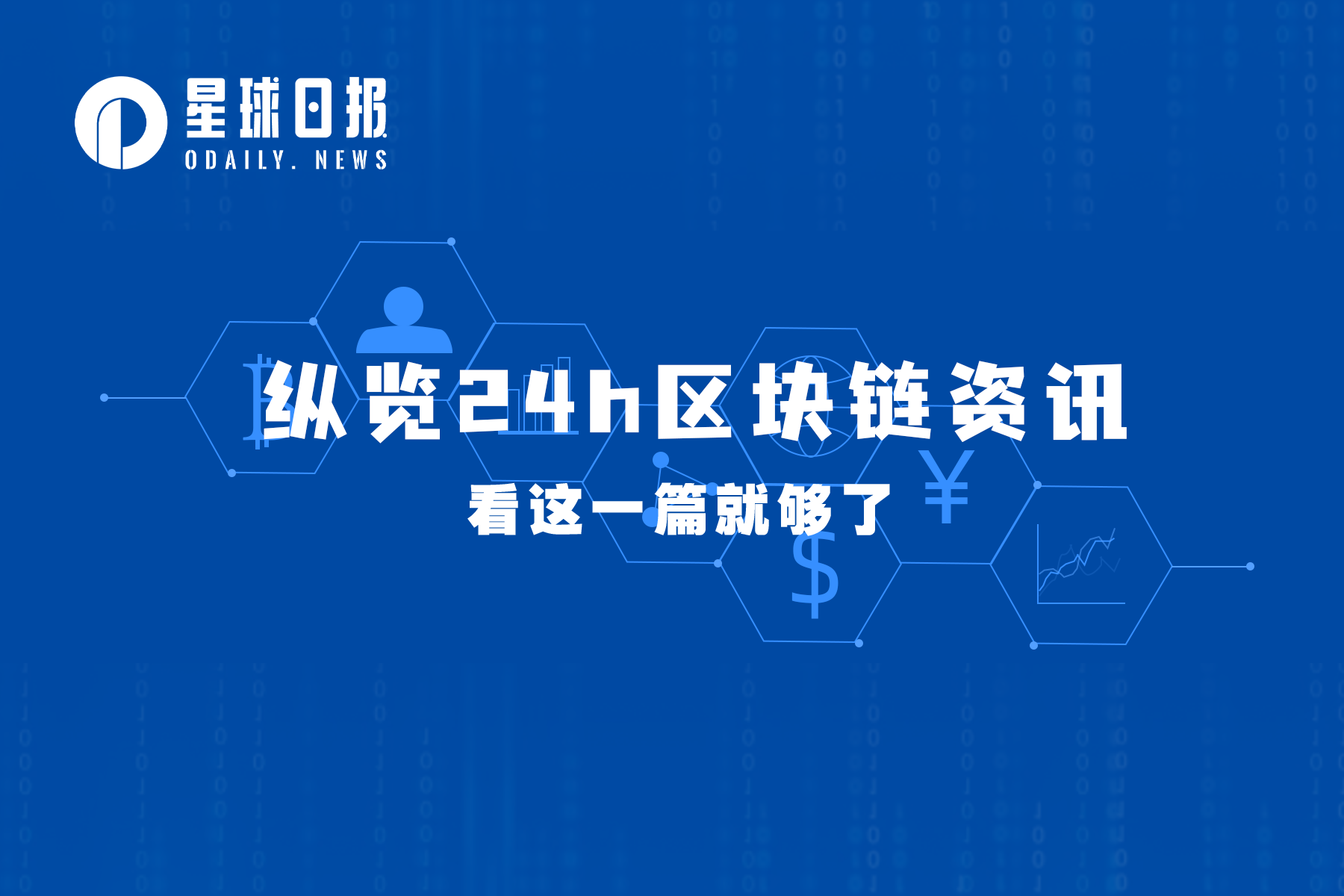星球日报 | Amazon推出托管区块链服务;Eralend称已发现黑客相关的可疑CEX账户(7月28日)

头条
Odaily星球日报讯 Amazon 推出托管区块链服务(AMB),允许用户使用其区块链基础设施更快地构建应用程序,扩展了访问和查询功能的可用性。AMB 提供调用节点,开发人员可以通过 RPC 来与数字资产以及多链上的 DApp 进行交互,而无需专门的基础设施。(CoinDesk)
Odaily星球日报讯 EraLend 发推公布了黑客攻击事件的部分进展,已发现和黑客相关的可疑 CEX 账户并向警方提供了相关信息,为追踪攻击者真实 IP 位置,已向 VPN 提供商提交了正式调查请求。
行业要闻
Flipside、Alchemy 等 13 家Web3公司联合推出统一加密数据平台“LiveQuery”
Odaily星球日报讯 数据提供商 Flipside 与区块链开发平台 QuickNode、Alchemy、Helius、Footprint、Playgrounds、StrangeLove、DappLooker、Credmark、Blockpour、BitQuery、SubQuery 和 Chainbase 联合推出统一加密数据平台“LiveQuery”,支持实时查询链上和链下数据 API,并与 SQL 并行使用。分析师不再需要在平台之间切换,从不同来源手动收集数据。此外,他们现在可以在单个查询中组合数据集,解锁新用例。
此外,除加密数据,该平台还将拓展更多其他领域,包括股票、体育、美联储以及人工智能数据。Flipside 正在接受 API 请求,这意味着任何 API 都可以添加到 LiveQuery 的市场中以方便访问。任何 API 都可以在平台内以编程方式进行查询。(PR Newswire)
美国总统参选人小罗伯特·肯尼迪证实已于近期购买 14 枚比特币
Odaily星球日报讯 美国民主党总统候选人小罗伯特·肯尼迪(Robert F. Kennedy Jr.)周三在 Twitter Spaces 证实其确实持有比特币。
肯尼迪表示:“在比特币大会之后,我决定付诸行动,为我的七个孩子每人购买了两枚比特币。”按照 2.95 万美元的价格计算,这 14 枚比特币当前价值接近 41.4 万美元。
在今年 5 月 18 日至 5 月 20 日举行的迈阿密比特币会议上,肯尼迪对比特币表示了支持。
上周他进一步承诺,如果自己赢得总统大选,他将免除比特币的资本利得税,并开始用比特币等硬资产支持美元。(CoinDesk)
韩虚拟资产犯罪联合调查组对 Delio、Haru Invest 及 WeMade 相关加密诈骗指控展开调查
Odaily星球日报讯 韩国虚拟资产犯罪联合调查组已对三项与加密货币相关的诈骗指控展开调查,包括 Delio 和 Haru Invest 高管涉嫌欺诈、Pica 发行方 Pica Project 高管涉嫌欺诈以及 Wemix 发行方 WeMade 高管涉嫌欺诈。
据悉,联合调查组计划从目前的案件开始迅速处理。(Hankyung)
RWA 公司 Securitize 即将发行房产信托代币化股权
Odaily星球日报讯 RWA 公司 Securitize 将于 Avalanche 上发行西班牙房产信托 Mancipi Partners 代币化股权,并于开始 9 月开始二级交易。一个月前,西班牙财政部批准该公司在受监管的“沙盒”条件下向少数企业和投资者发行数字资产股权。通过监管测试后,Securitize 可以更广泛地发行、管理和交易代币化证券。(The Block)
项目要闻
Sui:MovEx 违反锁定协议,已终止合作关系,未来不会分发 SUI 代币
Odaily星球日报讯 Sui 发文称,MovEx 在 DeepBook 的工作中收到了受合约锁定的 SUI 代币作为报酬,但 MovEx 却违反合约锁定,向钱包发起了交易。MovEx 没有将这些交易通知 Sui 基金会,Sui 基金会也没有以任何方式同意这些交易。在 Sui 基金会的要求下,MovEx 将代币退还给了主要接收地址,然后将代币转给了合格的托管商,以执行合约锁定限制。
由于 MovEx 的违约行为,Sui 基金已终止与 MovEx 团队的合作关系,未来将不会向 MovEx 分发任何一批 SUI 代币,MovEx 也不会继续作为 DeepBook 智能合约的主要贡献者之一。
目前,所有其他受合约锁定的代币都存放在同意执行此类锁定条款的合格托管账户中。
Odaily星球日报讯 Sui 官网发文称,Sui 测试网现已支持流动性质押,待所有兼容性测试完成后,该功能将在下一次升级中添加至主网。
Sui 表示,本次升级系通过 SIP 6 完成,在此之前,Sui 网络的质押者在完成质押后会收到一个代表权益的封装资产,但该资产无法流通,所以这意味着该部分质押代币实际上已从流通中被移除。而在升级之后,该封装代币将可进行自由转账、交易,这意味着开发者将可以借此提供流动性质押服务,并基于此创建更多 DeFi 应用。
Gitcoin Passport 与 Galxe 社区活动平台集成,旨在提升反机器人和女巫能力
Odaily星球日报讯 Gitcoin Passport 发推称,其与 Galxe 的社区活动平台完成集成,旨在提升反机器人和女巫能力。对此 Gitcoin Passport 推出 AntiSybilAssembly NFT,可于 7 月 31 日根据独特人性分数领取不同的 NFT。
Odaily星球日报讯 MakerDAO 本周四通过了一项增强 DAI 利率(DSR)的治理提案,计划将暂时将 DSR 提升至 8% ,旨在吸引更多的用户。
DAI 的发行量从一年前的 69 亿缩水至当前的 46 亿,而稳定币市场规模则有 1600 亿美元下降至 1270 亿美元。上周协议将 DSR 提升至 3.49% 以从竞争者处吸引用户。(CoinDesk)
Star Atlas CEO:公司将专注于制作低成本游戏项目,并计划三周内推出 Sage 在线浏览器新版本
Odaily星球日报讯 基于 Solana 的链游 Star Atlas 首席执行官 Michael Wagner 在社区中概述了公司的新愿景,包括专注于制作成本更低的游戏项目。
他表示,希望在大约三周内推出 Sage 的在线浏览器游戏新版本。Wagner 希望通过 Sage 和手游的推出,扭转 Star Atlas 的命运。
Wagner 说:“对我而言,这款手机应用是扩大用户基础的绝佳机会;从公司的角度来看,它实际上提供了一个从新资产类别中获得收入的机会。”(The Block)
投融资
Aethir 完成 1.5 亿美元估值 Pre-A 轮融资,Sanctor Capital、Hashkey 等领投
Odaily星球日报讯 去中心化 GPU 基础设施的领先者 Aethir 宣布完成 Pre-A 轮融资,融资总额超过 900 万美元,公司估值达到 1.5 亿美元。据悉,本轮融资是在 Framework Ventures 和 Infinity Ventures Crypto 领投的种子轮融资之后的又一轮融资,此轮由 Sanctor Capital、Hashkey、Merit Circle 和 CitizenX 等机构领投,Mirana Ventures、Animoca Brands、Momentum 6、Big Brain Holdings、Builder Capital、Tess Ventures、Maelstrom (Arthur Hayes)等参投。
新资金将用于在东南亚、拉丁美洲和北美等关键市场的全球业务扩张,并加强技术研发和应用创新支持。
据悉,Aethir 是全球覆盖的可弹性扩展的去中心化云基础设施(DCI)的先驱公司,旨在通过提供可扩展和安全的云服务来解决云行业面临的挑战,以满足全球游戏和人工智能公司的需求。
Animoca Brands 向Web3支付应用程序和协议 hi 投资 3000 万美元
Odaily星球日报讯 Animoca Brands 宣布向加密支付应用程序 hi 投资 3000 万美元。此外,hi 还与 Animoca Brands 建立合作伙伴关系,帮助其投资组合公司和整个Web3生态系统为 NFT 带来实用性。联合创始人 Sean Rach 表示,hi 计划利用这笔资金来扩展其应用程序,并为兼容以太坊虚拟机 (EVM )的 hi 协议的主网启动做好准备。
据悉,hi 正在致力于将人类身份证明 (POHI) 实施到其 KYC 流程中,但该流程不涉及扫描虹膜。hi 表示,该公司目前拥有 350 万用户和 100 万 KYC 用户,并计划通过实施 POHI 来增加这一数字。(CoinDesk)
以太坊动态存储扩容项目 EthStorage 以 1 亿美元估值完成 700 万美元融资,dao 5 领投
Odaily星球日报讯 以太坊二层网络数据存储解决方案项目 EthStorage 以 1 亿美金估值完成 700 万美元种子轮融资。本轮融资由 dao 5 领投,SevenX Ventures、Foresight Venture、DragonRoark、云九资本、Avant Blockchain Capital、Future Money Group、Gate Ventures、Vitalbridge、Galxe、GeekCartel、Rebase D. Ventures、W 3.Hitchhiker 和其他天使投资人等参投。
EthStorage 是基于以太坊数据可用技术的基础上提供可编程的动态数据存储的二层解决方案,团队曾两次获得以太坊基金会生态系统支持计划(ESP)的资助,分别用于数据可用性采样的研究和 2 层网络动态数据存储证明的研究。
EthStorage 同时也在 2023 年黑山举行的社区以太坊开发大会(EDCON)的 Super Demo 活动中获得了第一名。所有融资资金将用于扩大团队、支持研究、开发产品、提升品牌并吸引更多生态系统合作伙伴使用 EthStorage。
Passage 完成 600 万美元融资,Akash Network 领投
Odaily星球日报讯 Passage 发推称,完成了 600 万美元融资,Akash Network 领投,Druid Ventures、Vitwit、Cosmostation、Hyperchain Capital、Chorus One、Cogitent Ventures 等参投。Passage 将利用这笔资金进一步开发其社交工具,构建企业解决方案和 AI 集成。
宠物养成类元宇宙项目 The Animal Age 完成种子轮融资,Spark Digital Capital 领投
Odaily星球日报讯 宠物养成类元宇宙项目 The Animal Age 近期完成种子轮融资,此轮融资由 Spark Digital Capital 领投 ,Angelist ,Alumni Venture,Kraken,Vega Venture,Celo Stellar,Founders fund 等参投。投资金额暂未披露,此轮融资资金将用于产品研发、社区建设以及扩大其全球团队。
据悉,The Animal Age 依托于全球最大的猫咪慈善救助机构 "猫咪也疯狂俱乐部" ,致力于通过区块链技术、游戏、NFT 和元宇宙,创造全新宠物养成体验的场景,The Anmial Age 的首款产品则是猫咪主题的宠物养成类游戏。目前其猫咪也疯狂俱乐部 Facebook 粉丝群用户突破 110 万,该公司透露将在 7 月 28 日公布一些“大型合作伙伴关系”,并且在 30 日针对社区推出“猫奴养成计划”,期间将送出创世猫咪 NFT、稀有道具等;其猫咪养成类游戏也将在未来几周内上线。
全球政策
美众议院金融服务委员会批准《 21 世纪金融创新和技术法案》
Odaily星球日报讯 周三,美国众议院一个重要小组批准了由加密货币倡导者支持的立法《 21 世纪金融创新和技术法案》,该法案旨在为新兴行业制定了更明确的规则。
美国众议院金融服务委员以 35 比 15 的投票结果批准了这项由共和党主导的法案。该立法将制定加密货币公司何时必须向 SEC 或 CFTC 注册的规则。它为数字资产发行人向 SEC 证明区块链网络足够去中心化提供了一个流程,这将允许相关代币被归类为由 CFTC 监管的商品。该法案还要求两个机构参与联合规则制定,并要求对包括 NFT 和 DeFi 在内的问题进行研究。
此外,该法案还规定,数字资产本身并不是一种证券,因为它是作为投资合同的一部分出售的。
该法案下一步将提交至众议院农业委员会进行审核,其中包括为 CFTC 提供 1.2 亿美元的额外资金。根据该法案,CFTC 将获得监管这一资产类别的新权力。
值得一提的是,鉴于俄亥俄州银行业主席 Sherrod Brown 一直对加密行业持怀疑态度,该法案在民主党领导的参议院将面临很大的阻力。(彭博社)
美众议员 Tom Emmer:众议院金融服务委员会通过《区块链监管确定法案》
Odaily星球日报讯 美国众议员 Tom Emmer 发推表示,他提出的《区块链监管确定法案》(Blockchain Regulatory Certainty Act,简称 BRCA)在众议院金融服务委员会获得通过。
据悉,该法案在法律上编纂了奥巴马政府时期制定、特朗普政府时期重新制定、拜登政府时期仍然遵循的关键财政部指导方针,澄清了从不托管消费者资金的非托管区块链开发人员和服务提供商(矿工、验证者、钱包提供商)不必注册为汇款商(Money Transmitters),并且不受与托管加密货币交易所相同级别的监管。
Emmer 称,BRCA 提供数字资产生态系统监管确定性,以保持美国的创新,从而使未来的数字经济反映美国的价值观。
韩国银行联合会制定《虚拟资产实名账户运营指南》:交易所需储备至少 30 亿韩元准备金
Odaily星球日报讯 韩国银行联合会与金融当局和虚拟资产交易所协商制定《虚拟资产实名账户运营指南》,旨在加强保护虚拟资产使用者并防止洗钱等活动。
其中银行要求虚拟资产交易所履行对用户的损害赔偿责任(黑客攻击、计算机故障等问题),并储备不少于 30 亿韩元的准备金。
此外银行计划每年对实名账户用户进行强化的客户认证程序,包括实行收款转账时需附加认证以及长期未使用时限制收款转账等措施;计划将用户账户区分为限额账户和正常账户,并限制其存取款额度,同时已经建立了与实名认证相关的反洗钱标准和程序。
为尽快落实虚拟资产交易所用户保护措施,将从 9 月初开始实施储备金积累。此外,工作程序的编制和计算机系统的建立将于明年 3 月前陆续实施。(News 1)
Odaily星球日报讯 以色列成立特别审查小组,探索 DAO 监管法律,公众可于 9 月 3 日前反馈征询意见。审查范围包括关于组织状态、税收以及其他方面,以增强法律层面的确定性,减少 DAO 开展活动风险,并提升以色列经济潜力。(CoinDesk)
人物*声音
Paradigm 发布稳定币报告,敦促国会立法降低风险并推动稳定币发展
Odaily星球日报讯 Paradigm 发布稳定币报告,报告指出稳定币将是有效拓展支付系统的一次机会,但近期的政策视图将其纳入银行和证券框架进行监管,这将是一种倒退。国会应当解决锚定美元稳定币的用户风险、促进增长和竞争力、鼓励负责任的稳定资本创新。
Consensys 发布 ETHCC 和 ETHGlobal Paris 关于Web3未来五大要点
Odaily星球日报讯 Consensys 发布 ETHCC 和 ETHGlobal Paris 关于Web3未来五大要点,包括以下内容:L2将作为关键基础设施继续扩展以太坊、社交媒体正在走向成熟、抽象账户将推动下一轮大规模用户增长、开发重心将从基础设施转向应用、互操作性至关重要而协议须互相兼容。



